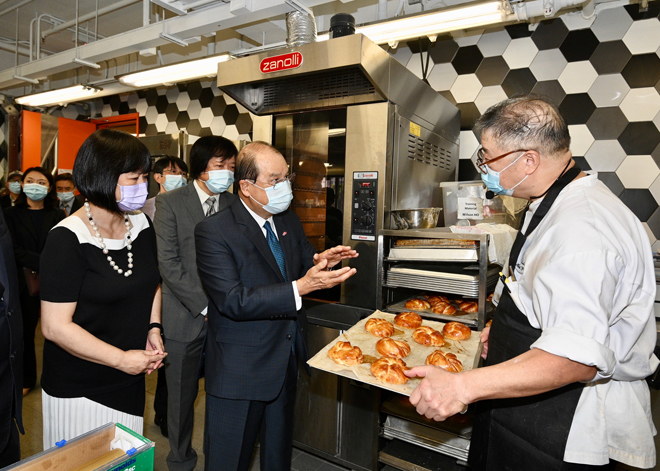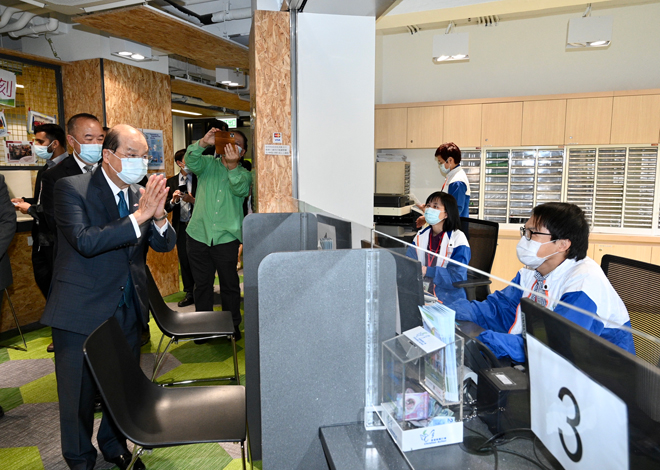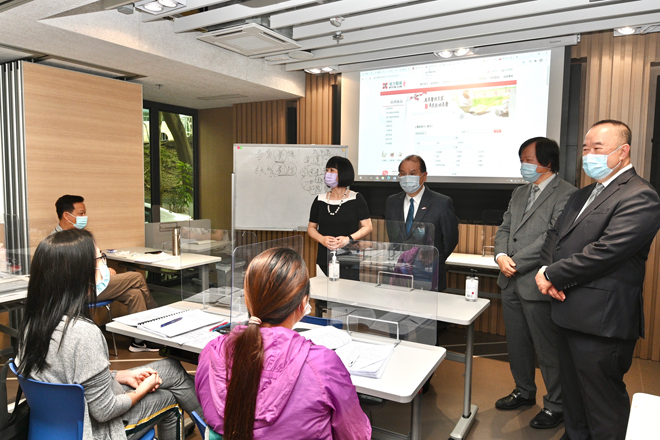Prepare for resurgence in coronavirus cases
Foster skills enhancement and upgrading
Back to Basics: stay true to original intention
22 November 2020

|

|

|
The epidemic situation in Hong Kong has been getting rapidly worse over the past few days. In the face of this menacing resurgence, what we need is more self-restraint and self-protection. In addition to wearing masks, going out less and avoiding unnecessary gatherings, we should also observe social distancing, maintain personal and environmental hygiene, and strictly abide by the infection control requirements and restrictions for different premises.
Keeping everyone on their toes amid epidemic rebound
To minimise the risks of spreading the virus, the HKSAR Government announced two days ago (November 20) the latest round of tightened measures, including the suspension of Primary 1 to 3 face-to-face classes and school activities of all primary schools for 14 days (i.e. from November 23 to December 6), and mandatory COVID-19 testing for people with symptoms, elderly care home staff as well as taxi drivers. Mindful of the grassroots' worries about their livelihood being affected in case they are tested positive and hospitalised, the Government is considering providing confirmed patients with a one-off subsidy.
The Hospital Authority has recently increased the time slots for collecting and distributing deep throat saliva specimen collection packs at its general outpatient clinics and is progressively installing more vending machines (bringing the total to 17) for distributing collection packs. The Food and Health Bureau (FHB) is going to set up mobile specimen collection stations or distribute collection packs at buildings or districts with cluster outbreaks to speed up COVID-19 testing.
The growing trend of staycation in guesthouses (including hotels) has sounded the alarm about the health risks associated with such activities. In view of this, the Government has announced earlier to tighten a series of social distancing measures, which included incorporating hotels/guesthouses into the list of scheduled premises under Cap. 599F, regulating the gatherings and the number of guests in such premises, and ramping up relevant infection control measures. Meanwhile, the FHB and the hotel sector are negotiating specific requirements such as limiting the number of guests in each room. Instructions will be issued once the details are finalised.
Taking into account the latest public health risk assessment, in particular the higher risks brought about by those mask-off activities and various social activities involved in recent cases, it is necessary to further tighten the social distancing measures implemented under Cap. 599F. The Government announced yesterday that live performance and dancing must not be allowed in any catering premises (including bars or pubs) as well as clubs or nightclubs; and premises (commonly known as party rooms) that were maintained or intended to be maintained for hire for holding social gatherings must be closed. The above measures have taken effect from 0:00 today (November 22).
We must not let down our guard as Hong Kong is at a critical juncture in epidemic prevention right now. The HKSAR Government is staying vigilant and keeping a close watch on the epidemic development. In order for the epidemic to be contained, the introduction of more stringent anti-epidemic measures will not be ruled out. We hope to give confidence to the Guangdong, Macao and Mainland authorities so that our cross-boundary activities can be resumed in a gradual and orderly manner and our economy be revived at the earliest possible time.
Economic prospects dependent on epidemic scenario
Hong Kong's overall economy was on the mend in the third quarter but will be largely dependent on the local epidemic scenario in the fourth. As the fourth wave of the epidemic is raging on, our economic outlook would remain uncertain. It is expected that the gloomy job market would come under considerable pressure and unemployment rate will continue to edge up.
In the midst of economic fallout and soaring unemployment, job hunting is all the more difficult. It is therefore of particular importance to pursue skills enhancement and upgrading, which is key to sharpening one's competitive edge. In this connection, the Government has been providing and strengthening support to enhance the employability and competitiveness of the local workforce through training and continuing education.
Upgrading skills for re-joining the workforce
Last Thursday (November 19), I visited the Christian Action Head Office for an update on the Employees Retraining Board's (ERB) implementation of the Love Upgrading Special Scheme (Special Scheme). I took the opportunity to talk to some trainees and encouraged them to proactively equip themselves with necessary skills.
Some of the trainees found the training courses diversified and practical, and would consider a career change after completing the courses. Some others were worried that continued unemployment would affect their livelihood and aspired to secure a job more easily through skills enhancement. Graduates of the ERB's full-time placement-tied courses will be provided with follow-up placement services of three to six months. Over the years, the employment rate of trainees has exceeded 70%, showing that the courses have effectively helped the unemployed re-enter the labour market.
Commissioned by the Government, the ERB launched Phases 1 and 2 of the Special Scheme in October 2019 and July 2020 respectively to support the unemployed or underemployed affected by the economic downturn for skills enhancement. Trainees were offered training courses of two to three months free of charge and a special allowance during the training period. The ERB has earlier raised the ceiling of the monthly allowance per trainee by 45% from $4,000 to $5,800. Moreover, "Enterprise-based Training" has been introduced as a new arrangement to support corporations and trade associations in arranging employees who are underemployed or taking no-pay leave to attend courses as a group on an enterprise basis under the Special Scheme. The scheme is well-received with the accumulated number of enrolments exceeding 23 000 since its launch in October 2019.
The Special Scheme imposes no restriction on trade/educational attainment or upper age limit. In addition, the ERB has introduced into Phase 2 of the Special Scheme a series of enhancements, including significantly increasing the number of training courses to about 300. I notice that while young people tended to opt for IT-related courses, many of the middle-aged went for vocational skills courses, such as those on security and property management and healthcare support, which might help them secure more stable employment. The Government will continue to create jobs and stabilise employment through a host of measures to provide assistance to those affected by the epidemic.
Accurate perception of the Constitution, the Basic Law and "One Country, Two Systems"
Last Tuesday (November 17), I attended the Basic Law 30th Anniversary Legal Summit hosted by the Department of Justice. Speaking on the theme of "Back to Basics", a number of renowned Mainland and Hong Kong legal professionals, Basic Law experts and academics shared their insights on "One Country, Two Systems", the Constitution and the Basic Law.
Having listened to the inspirational and insightful speeches of these heavyweight speakers, I could not agree more that Hong Kong people should uphold the original intent and spirit of the Basic Law, ensure the faithful implementation of "One Country, Two Systems", and develop a comprehensive and accurate understanding of the Constitution, the Basic Law and the importance of "One Country, Two Systems". I also share their views that the lack of a clear picture among some Hong Kong people of the Basic Law, the relationship between the Central Government and the HKSAR, the authority of the Central Government, etc., has resulted in fairly marked discrepancies in people's perception, understanding and recognition of the new constitutional system upon Hong Kong's reunification with the Motherland. In a nutshell, the full and faithful implementation of "One Country, Two Systems" is the linchpin, while "One Country" is the premise and basis of implementing "Two Systems". The incomplete and inaccurate perception of the principle and implementation of "One Country, Two Systems" has indeed led to many of the problems that have emerged in Hong Kong since the reunification.
Fully stepping up promotion and education
With a view to enhancing the public's understanding of the Constitution, the Basic Law and "One Country, Two Systems", and fostering a correct sense of national consciousness and identity, the HKSAR Government will continue to fully step up its promotional and educational efforts through various channels for different people and groups in society. The National Constitution Day, which falls on December 4, will be an opportune time to proceed with an array of government promotion and education activities.
I believe that a safe and stable society, where people uphold the "One Country, Two Systems" principle and the Basic Law wholeheartedly and act in accordance with the Constitution and the Basic Law, will enable Hong Kong to fuse into the country's overall development under its new development pattern and get back on track towards achieving a win-win situation.

